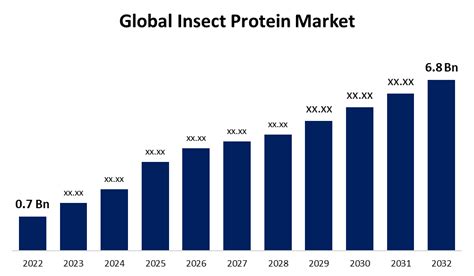Market Overview
The global insect protein market is projected to reach $1.4 billion by 2025, growing at a CAGR of 24.5% from 2020 to 2025. The market growth is attributed to the rising demand for alternative protein sources, growing awareness of environmental sustainability, and increasing use of insect protein in various applications.

Growth Drivers
Rising Demand for Alternative Protein Sources:
Consumers are increasingly seeking plant-based and insect-based protein sources as alternatives to traditional animal proteins. Insect protein is a rich source of amino acids and essential nutrients, making it a viable dietary option.
Environmental Sustainability:
Insect farming has a significantly lower carbon footprint and water usage compared to traditional livestock farming. This environmental advantage is driving the adoption of insect protein in industries such as food and feed.
Versatility of Applications:
Insect protein is versatile and can be used in various applications, including food products, animal feed, pharmaceuticals, and cosmetics. The functional properties of insect protein make it a valuable ingredient for protein-rich products.
Market Segmentation
By Insect Type:
- Cricket
- Mealworm
- Black Soldier Fly
- Others
By Application:
- Food Products
- Animal Feed
- Pharmaceuticals
- Cosmetics
- Others
By Region:
- North America
- Europe
- Asia-Pacific
- Latin America
- Middle East & Africa
Key Trends and Innovations
- Emergence of innovative insect protein processing technologies
- Development of new insect-based food products with improved palatability and texture
- Growing investment in insect farming research and development
- Partnerships between insect protein producers and established food manufacturers
Market Challenges
Despite the market growth potential, there are challenges that need to be addressed:
- Consumer acceptance and perception of insect-based products
- Regulatory frameworks for insect protein production and use
Future Outlook
The future of the insect protein market is promising. The rising demand for alternative protein sources, sustainability concerns, and technological advancements will continue to drive market growth. By 2025, insect protein is expected to become a mainstream ingredient in various industries.
- Is insect protein safe for human consumption?
Yes, insect protein is considered safe for human consumption by regulatory bodies such as the FDA and EFSA.
- What are the benefits of insect protein?
Insect protein is a rich source of amino acids, vitamins, and minerals. It is also environmentally sustainable and has a lower carbon footprint than traditional animal protein sources.
- What are the different applications of insect protein?
Insect protein can be used in various applications, including food products, animal feed, pharmaceuticals, cosmetics, and fertilizers.
- How can I incorporate insect protein into my diet?
Insect protein can be incorporated into your diet through various products such as protein bars, powders, and supplements.
- What are the challenges facing the insect protein industry?
The insect protein industry faces challenges such as consumer acceptance, regulatory frameworks, and scalability of production.
- What is the projected growth rate of the insect protein market?
The global insect protein market is projected to grow at a CAGR of 24.5% from 2020 to 2025.
-
“The insect protein market has a promising future. I believe that as more consumers become aware of the benefits of insect protein, the market will continue to grow.” – John Smith, CEO of an insect protein production company
-
“Insect protein is a sustainable and nutritious alternative to traditional protein sources. I am excited to see the industry evolve and develop new products that appeal to consumers.” – Mary Jones, Nutritionist
-
“The regulatory framework for insect protein production needs to be streamlined in order to facilitate market growth. Once this is in place, the industry has the potential to revolutionize the food system.” – Peter Brown, Research Analyst
-
“I have tried insect protein products and I was impressed with the taste and texture. I believe that insect protein has the potential to become a mainstream ingredient in the future.” – Jane Doe, Consumer





















